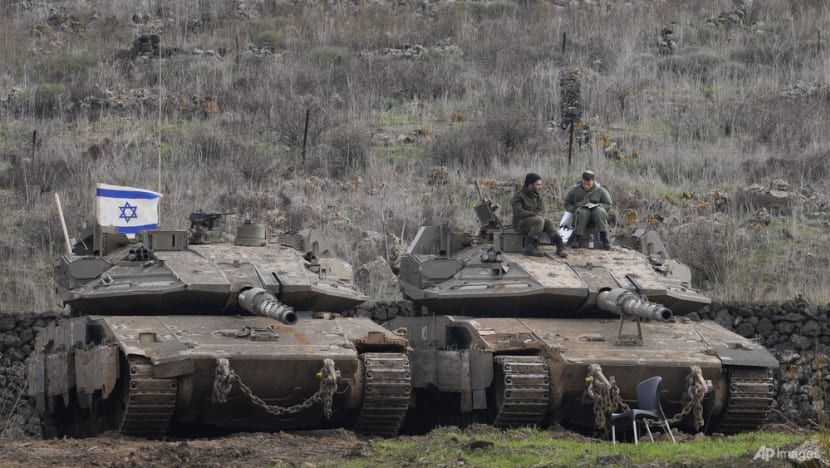Commentary: Israel wasted no time to secure its interests in Syria
Israel’s air strikes and ground incursion in Syria were carried out with little risk to itself, says Carl Skadian from the NUS Middle East Institute.

Israeli soldiers sit atop an armoured vehicle near the so-called Alpha Line that separates the Israeli-occupied Golan Heights from Syria, Dec 7, 2024. (AP Photo/Matias Delacroix)

This audio is generated by an AI tool.
SINGAPORE: In recent months, Israel has shown itself to be adept at creating, and exploiting, events in the Middle East to secure its interests.
Its latest round of actions began as its military operations in Gaza wound down: In mid-September, thousands of pagers and hundreds of walkie-talkies were detonated remotely in Lebanon, decimating Hezbollah’s chain of command.
Barely two weeks later, the Israel Defense Forces (IDF) invaded Lebanon, laying waste to much of Hezbollah’s feared arsenal of rockets and missiles. According to its own sources and others, as much as 80 per cent of the stockpile was destroyed, along with the militant group’s ability to produce more weapons.
Bloodied and bowed, Hezbollah entered into a ceasefire, turning its back on a vow to keep battling Israel until the war in Gaza ended.
OPPORTUNITY IN SYRIA
Over the weekend, another opportunity presented itself to Israel: The fall of Bashar al-Assad’s regime in Syria. The IDF wasted no time. It launched hundreds of air strikes, which wiped out the Syrian navy, levelled missile and other ammunition storage facilities, and reduced fighter jets, tanks, and other weapons to twisted metal.
Simultaneously, the IDF launched a ground incursion into Syria, its first in 50 years, creating a larger buffer zone between the two countries, and seizing advantageous high ground.
In doing so, the IDF significantly lowered the risks posed to Israel from Syria, and ensured that whoever runs the country after Assad’s ouster will not pose a significant threat.
Perhaps most importantly, the assault, which was unprecedented in scope, eliminated the infrastructure used by Iran to transport weaponry to Hezbollah. These operations were carried out with little risk to Israel itself, with a power vacuum in Syria, an absent Russia, and an Iran realising that a year of war in the region has left its defensive strategy in tatters.
At the recent Doha Forum in Qatar, one expert ventured that Tehran has lost “every strategic bet” it has placed.
ISRAEL IS VIRTUALLY UNCHALLENGED
There have been some concerns that Israeli actions run the risk of igniting a wider war, or ending the ceasefire in Lebanon. These are misplaced.
As the past few months have shown, Israel is virtually unchallenged now. The United States has kept its foot off the brakes, and groups and countries in the region that could make life difficult for Israel have chosen to keep their powder dry and restrict their actions to pointless rhetoric.
The United Nations’ Special Envoy for Syria, Geir Pedersen, warned Israel that its air strikes and ground invasion must stop, and it should not interfere with the transition of power in Syria. But what Israel is doing is no different from what the US and Turkey are also attempting: Securing their own interests.
America has sent in B-52 bombers to pound the Islamic State, while rebels backed by Ankara have seized territory in Syria’s north. All have taken advantage of the window of opportunity presented by the fall of Assad to draw a map of Syria that looks good to their eyes.
The real danger posed by the extremely complex situation in Syria is that this jostling puts the country on a path akin to that taken by Libya post-Muammar Gaddafi: A failed, conflict-ridden state with little prospect for resolution.
It could be argued that Syria is already there, but things could get much worse. It is worth remembering that the Islamic State emerged out of the ashes of the Syrian civil war, sparking terror in Europe and elsewhere, and inspiring sympathisers to plan attacks, even in Singapore.
It is uncertain if the rebel groups in Syria have indeed gone back on their ideals, despite the soothing noises emerging from Hayat Thahrir al-Sham, the largest of them, or whether it is just the Taliban by another name.
What can reasonably be concluded is that the actions of outside actors are an enabling factor for the latter scenario.
Carl Skadian, a former journalist and editor for 30 years, is Senior Associate Director at the Middle East Institute, NUS.











